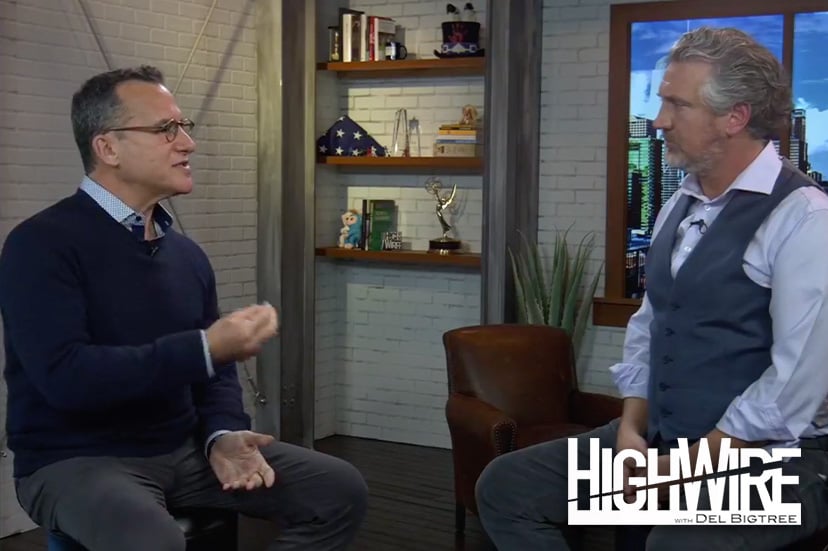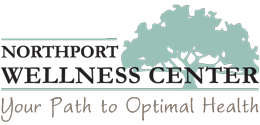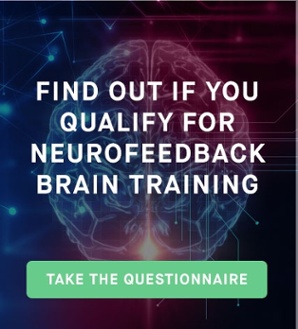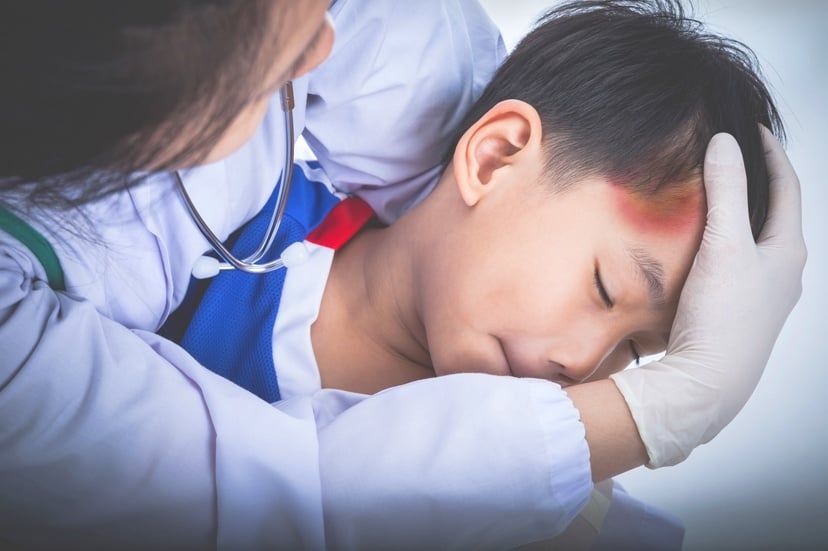
Dr. Lawrence B. Palevsky, M.D. was a recent guest on 'The HighWire with Del Bigtree,' a podcast tackling mainstream media topics with alternative—at times, unconventional—perspectives. During this episode, titled "U.S. Government Loses the Great Vaccine Debate" (transcribed and embedded below), the board-certified holistic pediatrician outlines his take on the oft-debated subjects of vaccinations, best practices for treating childhood and adulthood illnesses, and the degree to which medical protocols have drastically shifted throughout the years.
Watch Dr. Palvesky on 'The Highwire with Del Bigtree'
Del Bigtree: "Now, I have the special opportunity to introduce one of my favorite doctors in the world. Yes, I love doctors, especially guys like this. This is Lawrence Palevsky."
Dr. Lawrence Palevsky: "I entered NYU School of Medicine in 1983, finishing in 1987. The majority of the material presented in medical school was 'These are the diseases, and these are the ways in which you treat them.' The safety that I would want for kids, having taken the Hippocratic Oath of 'First, do no harm,' is not happening.
"The vaccines are not safe the way we are told that they're safe. There's never been a study to show that vaccines don't cause autism. If you show me the studies that show that there's no relationship between vaccines and atopic disease—Where were you comparing vaccinated kids to non-vaccinated kids?
"You can't inject neurotoxins into the body and then question why so many kids are motor-delayed and speech-delayed and can't process, can't sit still. And everyone keeps looking around and saying, 'What's wrong? What's wrong? What's wrong?'
"In our current state of affairs, we're not allowed to ask the question. That's not science anymore. That's ideology and dogma."
DB: "Alright. I'm here with Larry Palevsky. I mean, what an honor. You and I, you know, we run into each other on the speaking circuit once in a while, and honestly, I'm really bummed, sometimes they'll put us on opposite stages at the same time. But the last time, actually, I went in, cause I always like to check out, you know, how you're saying things, and the clarity with which you're saying things.
"I mean, you were just watching Plotkin in the video we just showed. You've said similar things. You can't say vaccines don't cause autism. What do you think the average person out there that maybe is tuning in to the show for the first time, what do you think's going on in their mind when they're watching that Plotkin video? Does it matter to them?"
Dr. Palevsky: "Well, the question for me is how do people come to know things? Do they come to know things because they just swallow what they're told by the authority, passively, just accepting and giving up their own inner authority for the powers that be, or do they come to know something because they've researched it, or even experienced it?
"And my concern is that more and more people who listen to Dr. Plotkin are just swallowing what he says and not doing their own research. So, for the nine-hour deposition, I would recommend that people go listen to it themselves. For the 80 pages of the HHS [U.S. Department of Health & Human Services] initial paper and then the response by HHS, and then your response, go read it yourselves. Don't listen to necessarily what you say and just accept it. Go read it.
"Have the experience that there is more of a controversy here than just what you're told. Be responsible, take responsibility, take your power back and decide for yourself.
"And I think you said it, you said it correctly, is that the vaccine program is allowing people to take back their power because more and more people are saying, 'Yeah, I believe vaccines are safe,' and then having the experience more and more and more that they're not. And now, more and more, people are finding out that they know people who are vaccine-injured.
"You can't avoid finding vaccine-injured people, not just children, but adults. The whole Alzheimer's and dementia group, all the neurological diseases that we're seeing in adults. You can't not know that there's something going on—and people are realizing, in my experience, 'I was fine, I got the vaccine, and now I'm not.' But what we're hearing from the medical community is, 'I punched a wall, I broke my hand,' and the medical community is saying, 'Yes, you broke your hand, but it's not from punching the wall.'
"So we're having this disconnect that people's experiences are no longer valid. And what I'm seeing is that people's experiences are becoming more and more valid, and that is raising the bar for people to take back their power."
DB: "There are also, I think, I mean, one of the great things is you're out there. As any movement like this, you know, other, you know, civil rights movements throughout time, once they start being emboldened, once they start stepping forward and speaking out and saying, 'This is who I am, this is what I believe,' we are surprised to find that our neighbor actually, 'Oh, you're not vaccinating your kid either?' or 'Your child's injured?' 'I didn't know you had an autistic child. Yeah, I never bring them in public.'
"But that's, this is what's happening. And I think this is what The New York Times was really freaking out about, right? Is that it's not that we're so clever, so brilliant, it's the fact that it's the truth.
"First of all, it's really hard to stop the freight train of truth. And then, when people start recognizing there's other people out here and they start telling the story, we are now at a time where we're saying, 'Oh my God, I know so many people that actually believe they're injured by vaccines. I had no idea.'"
Dr. Palevsky: "Well, see, most people, I would say in the almost 20 years of me looking into the subject of vaccines, I would say that I don't know anyone who started their life out not thinking vaccines were safe and effective. Everyone thought vaccines were safe and effective. They came to know that they might not be through research and thorough experience.
"And so they stopped swallowing the party line and they actually started doing their own, their own empowerment. And I think that's what's freaking the community out is that people are actually learning on their own that they've been lied to."
DB: "What do you mean, you went through med school? Is there, I mean, I guess to begin with, what is the mentality of a doctor? I mean, we put them on pedestals. We act like they're so much smarter than me. So, if they're saying vaccines are safe, I shouldn't question it.
"You know, are you, do you get in the profession because you want that type of power? And what makes us Stanley Plotkin? And what, why is he not seeing or asking the obvious questions?"
Dr. Palevsky: "Well, first of all, I graduated medical school in 1987. I had no reason to believe that vaccines weren't safe. I administered them in residency. I administered them when I was an ER physician, when I ran an intensive care unit. I administered them initially when I was in practice, and I did it because I was told that that was what was best for children. But then, when parents started saying to me, 'Did you know, Dr. Larry, that there's mercury in vaccines?' I said, 'No.'
"I gave a child a vaccine, and within a couple of hours he got swollen lymph nodes throughout his neck. He was sick with a fever, and this was a well kid who all of a sudden developed this. And then all of a sudden, I started hearing more and more stories. And the pediatricians whom I know are doing things based on what they think is best, there's no reason for them to believe that what they're doing is not for the benefit of children.
"But my question to them is: Do you know what's in vaccines? Do you know that aluminum is in there? Do you know that it's a nanoparticle? Do you know that a nanoparticle can pass the blood-brain barrier? Did you know that the pharmaceutical industry uses aluminum and other nanoparticles to get drugs into the brain? Did you know that aluminum as an adjuvant is tightly bound to viral and bacterial antigens? Therefore, did you know that there's a possibility that aluminum-bound adjuvants can enter the brain? Did you know that the pharmaceutical industry uses polysorbate 80 as an emulsifier to enhance the delivery, excuse me, the delivery of drugs when it's attached to the nanoparticles?
"No, they don't. Did you know that polysorbate 80 is in vaccines? Most of them. And that can enhance the delivery of vaccine materials? 'No, I didn't know that.' Did you know that there are no studies actually evaluating whether vaccine materials enter the brain? 'No, I didn't know that.' Did you know that one in six children have neurodevelopmental disabilities? 'Uh, no.' Did you know that that study's out of 2008; we're now in 2019. Where's the update? Are children worse?
"So, it takes somebody who's willing to think and actually be willing to not just take what the title of the article says or what the title of the fascinating HHS letter says and look deeper and not just say, 'Okay, I agree with that, but do your own research.' And I don't know if medical doctors have the time or want to know, because I'll tell you, some pediatricians with whom I've spoken over the years are devastated to find out that they have been doing this to children over the years because they didn't know the lack of safety studies, the potency of the materials in the vaccines, the aborted fetal tissue, the foreign DNA, the materials that can get into the cells that can destroy the mitochondria, that can destroy the brain.
"They're all there. But you have to be willing to accept that you don't know what you don't know."
DB: "You know, we, I say on the show all the time, that I'm not here on 'The HighWire' trying to tell you what to think. I'm trying to teach you how to think. I'm trying to teach those of us—I mean, we really have lost the ability to be critical thinkers, and we just take whatever we're told, and you know, we've got to stop doing it.
"So you're right. You can't just hear what I have to say about the HHS notice and go, 'Yeah, I got that.' You really have to read it, like, you really have to. And then, read it several times. I had to. I mean, you know, as you start going through all this information, we're laying it out. Did we get it? Is it all there? But it's, there's a lot of information there, you know, so you've got to get involved there.
"And I mentioned, you know, last week's show. I had a friend I was talking to in the U.K. I hadn't talked to for a long time. And he's like, 'Doesn't it bother you that people are following you and they're not, they're just stopping all vaccines and they're not thinking about it?' And I want to address this today, because you know what, I actually do think there's an issue to that.
"And, what I mean is that I am getting so tired of seeing—I think last week I saw three different posts. One was, you know, from some vaccine choice, or vaccine risks, or something—one of the movement, you know, a mother saying: 'I'm at the hospital, my 6-month-old baby has a 103-degree fever and doctors don't know what it is.' Or another post: 'I personally am at the hospital. I had a hundred and, you know, three- or four-degree fever, and the doctor doesn't know what it is.' And, you know, or my child, or I read that, you know, um, there's 20 people in Washington or something that are unvaccinated, their children aren't vaccinated. And they have the measles, and they're at the hospital.
"And I'm, and I'm thinking, What are you doing at the hospital? I mean, if you're understanding what we're talking about, you don't need a hospital for these things. And so are you just, are there people out there that are just saying, 'Oh, I'm not vaccinating because Del Bigtree said so,' and not—there is so much more to this, right? I mean, it's not just about not vaccinating. You need to be making a choice about natural health. And the second you walked in the hospital, you're giving up on that choice, or there's something you don't understand.
"How do we—what's going on? How do people think it's that they need to be at a hospital with a 103-degree fever?"
Dr. Palevsky: "When I went to medical school and did my residency, most of the pediatricians who were teaching us had started out in practice in the 1940s in New York. And they practiced through the '80s and '90s. And they had experience, they had smell, they had taste. And the mothers and fathers and grandmothers and grandfathers that they worked with were handing down oral traditions: how to take care of your child for teething, how to take care of your child for a fever, what to do for a rash, what to do for mucus in the nose, what to do for a sore throat, what to do for shaking, chills, what to do if it hurts to pee, what to do for vomiting and diarrhea, what to do for pink eye. And that oral tradition has been lost for the past two generations, at least in what I have seen.
"So, what you have is a lot of fear, because a fever becomes, 'Oh my God, my kid's gonna die.' You and I cannot go into that mother's heart and tell her what to do, because she's in her state. And I would never negate the state that she's in. But what's lost is the grandmothers, the aunts, the cousins, the elders, the sages, the crones, who have that experience, who can actually say, 'This is the tradition we hand down.'
"Now, it's over-the-counter medicines, which are dangerous to the babies. Now, it's antibiotics right away. And, most of the time, when children have [a] fever, it's not an infection. But how do you tell that to parents? And most of the families in my practice, they learn that because I make them—and I mean, make them, in a compassionate way, go through the trial. I'll be with you, I'll hold your hand. But I need you to go through the experience of your child having the fever and watch to see what happens.
"And once the parent has the experience, then it's wisdom. Then it's real inner knowledge. Right now, it's—there's nothing in there, or there's very little in there. But that fear, that angst—and that comes from the media, that comes from the people around them who carry the same fear—and you're right, it ain't enough to not vaccinate if you're making that choice."
DB: "Did Pharma drive that, that spike, that nail between our elders and us? But isn't that really what they did? 'Don't listen to your elders. Don't listen...'"
Dr. Palevsky: "Residency and fellowship, by 1991, I already started to see the shift to protocols and not to clinical medicine. So when I was teaching medical students in the mid '90s, and they would say, 'Okay, I had a kid with a headache and the MRI showed, I would say, 'Well, did you take a history? Did you take a physical? Like, what's the child eating? Did the child fall? What did the child take as a supplement? Is there strife at home? Is a child sleeping? Anybody getting divorced at home? Did somebody die at home?' You know, all these psychosocial and environmental issues, were no longer being asked.
"And so, medicine was being trained to: 'Here's the symptom, here's the fix.' So I can't say if it was Pharma, but I can say that something switched in the early- to mid-'90s, where physicians were no longer asking questions. They were just following protocols. And what happens when you follow protocols is you don't practice clinical medicine anymore, right?
"So you don't know, let's see, if a child's throwing up: 'Is it, is it a virus? Did he eat something? Did he, did he ingest another? Is it a, is it a parasite? Is it somebody at home is under a great deal of stress, and that's how the kid manifests the stress? Did the kid breathe in something that caused vomiting?' So, these clinical questions are no longer asked.
"And in the times when I do have interface with medical students or younger doctors, there's blank looks on their face when I ask them for a differential. 'Okay, so the kid has a headache, what are all the possible reasons that the headache could be there?' And they don't know. They don't know because they go right to the test. 'Here's the MRI, here's the CAT scan. And we gave the kid Tylenol or Motrin and the kid's on a, on a non-, only a liquid diet. And we're watching, like, but what's the etiology? What caused it? And so, again, it's lack of self-think, it's lack of critical thinking that I've seen.
"And that's why I take time with families when I work with them, because it takes a while to figure out: 'Why is the kid presenting with those symptoms?' Because, sometimes, it's diet in one kid. And, sometimes, it's the emotions in the other kid. And, sometimes, it's the family, sometimes it's parenting, sometimes it's the electromagnetic radiation. Sometimes it's poor sleep. I mean, sometimes it's school."
DB: "It's your kid. You got to get involved. You gotta be that. So, you know what is—and I want, I want my audience today that has some understanding of fever—some don't. I know that some of the people that were putting out those tweets this week are probably watching this show.
"I saw, you know, when we started talking about this with our, with our team, my executive producer Jennifer, said she was in a mommy group and they were all talking about, you know, well, 'Fevers, I don't play around with fever. As soon as a fever, I go Tylenol,' you know, and that idea. So there's two things: What happens with Tylenol if you stop the fevers? Fever's supposed to be happening. And then I also hear people that aren't vaccinating the kids that will say, 'My kid never gets sick. Like, and has never been sick.'
"We didn't vaccinate our children. And I wouldn't say that. I would say this: They get fevers, it lasts like a day. It's not like three, five days, you know. They get hot, they get cranky, you know, we bundle them up in bed, we let them sweat it out. And, you know, a lot of times it's almost like they're a different person, their eyes light up, and there's something beautiful. It was like, you know, it's almost like a metamorphosis.
"Am I missing something? Are kids not supposed to get sick at all?"
Dr. Palevsky: "So, when the pediatricians trained me in, and us, in the '80s, one of the things that they taught us, was in their experience, when the kids had their febrile illnesses, regardless of what the cause was, if it didn't need antibiotics and it took its course without intervention, they would almost always see a developmental growth spurt after the fever was over that. That folklore, that tradition, has gone.
"So nowadays, the mother will say, 'Well, I don't mess around with a fever, I'm going to... And the bottom line is that the chemicals that produce a fever are active in the body, even when you don't have a fever. And the reason they're active in the body is because materials that are impure to the body are always coming in. We breathe them in, we eat them, we put them on our skin, we bring them into our nervous system, and we inject them into the body. And even the pure material that we put into our body, the byproducts of those materials, they're also impure.
"So, the body is built—that's why we exhale. That's why we pee. That's why we poop. That's why we sweat and smell. That's why we sleep. That's why we exercise, to get rid of waste, to get rid of the materials that stress our body. The materials that caused fever are the same ones that are helping us to get rid of those wastes. So when we have the fever, we're taught, 'Oh it's a bacteria, oh it's a virus.' Well, actually, newer and newer and newer science is showing that the bacteria and the viruses in our body, already of which there are over a hundred trillion of them, may be playing a role in helping us to get rid of the wastes.
"So, that goes back to what the mentors in my residency and medical student training taught us, is that the children would have a developmental growth spurt after the illness was over. And what they, what they were saying is that the onset of that illness is the peak of a stressful period in a child's body that requires rest, fluids, no food, quiet and toning it down. And that allows for the reset that allows for the waste to get out of the body. And then the child is now advanced, because the immune system and nervous system of a baby is immature and it needs pruning.
"And one of the ways it prunes is with a fever, and not every child gets sick with airway, gastrointestinal, skin or throat issues. Some children get their illnesses through their emotions, so they'll just be out of control behavior. They'll scream it, like sort of like that, you know, 'I'm mad as hell and I can't take it anymore!' And they let it out, and then they feel better. So they get it out through their emotions.
"Children not getting—there's always one part of the body where the child is expressing the release of the material, and it may not be just in mucus, or diarrhea, or vomiting, or fever and, we've lost this information. We've lost it. We've lost it, because over-the-counter medicines are the go-to. And I would say that that the over-the-counter medicines that we use are probably as dangerous, if not more dangerous, than the ingredients we inject into kids' bodies. And the studies show it. The studies show that Acetaminophen is really, really dangerous to the detoxification ability of a child or of an adult. And we just keep administering it.
"And, again, don't look at me. The science is there. I don't, I'm just transmitting the science. And if people don't believe me, go read it, because the science is there. The science that says that these drugs and over-the-counter medicines are safe are actually done by the companies that sell the product.
"So, we knew, we need independent studies, and that's one of the things that, you know, going back to the vaccine issue, that's one of the things that as a doctor, and when I was taught in medical school—I mean, I was taught: Start with a hypothesis, have no bearing on the results, do the experiment, observe the results, and summarize the results without having any bias about what those results should be. So medical school actually trained me to become a critical thinker, and that's what I ask parents to do—is start with a hypothesis, and be able to look at a situation with uncertainty and unknown, and allow for the answers to come.
"We're now at a situation in our culture where most people need to have the answers before they actually go through the process. And that's dangerous, because then you lose a certain piece of brain development, which says, 'I don't know, let me figure it out.' And that's how toddlers learn. That's how the toddler brain develops. 'I've never done this before. I need to figure it out. I know I'm going to fall. But it's okay. I'm going to stand up and do it again, and I'm going to do it again.' That's why when you see a toddler look at blocks, they're going to take it and stack it, and they're going to stack it again, and stack it again, again and again, and they're gonna push it over, and then they're gonna do it again and again and again. They didn't know what they were going to do when they started, but they figured it out because they were willing to go into the unknown.
"And nowadays, I see in my practice and when I lecture and when I speak to people, is that the answers have to be there first before the exploration, the investigation, the identification, the examination—and that's missing. That's the 5-year-old comes in with a headache, and the MRI shows, rather than a 5-year-old comes in with a headache and, 'He fell three days ago and nobody knew until today.' These are the things that are missing a lot, in my experience."
DB: "For the parents out there, is there just—not to just keep harping on the same thing—is there a temperature? Is there—my mom never had a thermometer, she refused to allow a thermometer in her house. She said, 'You'll get over it.' Is there a temperature at which you probably should go to the hospital? Is there anything, like, for parents that really want a tool, some way to say, 'I know I'm okay.'
Dr. Palevsky: "So in 1991, I started working in an emergency room in the Bronx, three to four 12-hour shifts a week. And, somewhere along the way, like two years later, I wanted to see if private practice would be right for me. So I approached one of the practices, in Manhattan, with pediatricians who trained me in residency at Mount Sinai.
"And, I said to one of the guys, who is a pediatric infectious disease specialist, I said, 'What do you do for all these kids who have high fevers?' Cause, in the emergency room, you have to do these tests, these tests and these tests. And he looked at me and said, 'Larry, if I did all those tests on all those kids, I would lose half of my practice.' I said, So what do you do? He said, 'If you had a kid with 105 fever, and was looking at you talking, babbling, drinking, peeing, sleeping, arousable, alert, interactive, consolable—and then you had a kid who had a 100.8 and you couldn't wake up, which fever would you be concerned about?' And the answer was 100.8.
"So, I try to teach parents to not treat the number on the thermometer, but to treat the child, just like he taught me 25 to 26 years ago, which is, 'Is the child alert? Awake? Arousable?' So let the child sleep, but give the kid a little, you know, pat every so often and the kid goes, 'Ehhhhh,' you know the kid is fine. 'Is the child interactive? Drinking? Urinating? Is the child in respiratory distress? What's the child's color?' And I list all these things on my website so that parents can follow a checklist. And I get emails and emails from parents who say, 'If it weren't for your checklist, I wouldn't have made it through.' Because it's really about gaining experience that we want to treat the child who has a fever, not the fever.
"Like, I don't want to treat—like when I was in medical school and residency, we'd say, Yeah, the diabetic in room one and the asthmatic in room two. And, over the years, we started to learn, No, no, it's the child with asthma, the child with diabetes, the child with autism, because these are human beings. And there's much more than just looking at the minuscule fever. You're going to miss connecting to the child.
"And, when I first started doing the more alternative and holistic practice, I would tell parents, Get undressed, hold your child, and do skin to skin. And the children would get better. Or, I would say, Use essential oils, use lavender, lavender on the tops of ears, the back of the neck, maybe a little bit in the middle of the chest to calm the heart. These are acupuncture points. And the parents would say, 'Wow, my child felt better.' And I'd say, Oh, I don't know if it's the essential oils or the fact that you just touched your child. You just connected to your child. And more and more, by going to the medicine chest, you're ignoring your child.
"In August of 2017, I was on an airplane going to New Mexico, and there was a family sitting in front of me, and all of a sudden the 2-year-old girl starts screaming. Now, of course, the air pressure is probably going to hurt. And the father's trying to help the child, and the mother stands up, frantic, and is ravaging. I mean, she's just pummeling through the suitcases above. And then she puts her bag on her chair and she's rummaging through, and she's going crazy, and the kid's on the father screaming. She's going through and going through and going through and she pulls out an ear thermometer to stick on the child.And I sort of smiled and said, Why don't you pick up the child and touch her and feel, is she hot?
"And so, that's what I'm seeing a lot of is the loss of the knowledge, the wisdom, to actually connect to the child and know how to go through—'Let's see, my kid is alert, my kid's talking to me, there's no rash, breathing's okay, color is pink, maybe a little pale.' And then parents confuse the word lethargy to listlessness. Most kids, when they're sick, are listless. They're pokey. They don't want to be bothered. They don't want to be—'Are you okay? Is everything alright? Can I get something for you? Do you want something?' They don't want that. They want quiet. So they're listless. Lethargy is dangerous. Lethargy is you pick up their arm and you can't get them to even hold tone. You don't want that. You want to avoid that happening.
"So the idea is to start learning to connect to your kid. Start learning that you have the ability, follow the checklist. The most important thing is that, well, when kids are sick, the first thing that parents say, 'My child won't eat.' And I go like this—applause, applause. The kid is smart because the body needs not to eat, but to hydrate, and hydrate a lot, and rest. Turn it down and let it evolve, and keep watching. But, you know, that takes, again, another oral tradition we need to instill in our parents.
DB: "So in lieu of an oral tradition, we can see some of the things. I mean, you talk about all of these, we could go on for days and days. What website or where should we go to get your 10, you know, things that you tell your parents?"
Dr. Palevsky: "Right. So my website is DrPalevsky.com. D-R and then the spelling of my last name, P-A-L-E-V-S-K-Y.com. And I have an "If Your Child Is Sick" section where I provide options for treatment of fever, and options for cough, and why mucus is produced in the body, which it needs to be produced to get rid of wastes, and what to do if your child is sick and has fever, and how to follow a checklist and when to call your doctor."
DB: "Fantastic. Larry, thank you so much for joining us. I think that a lot of parents will probably download it right now. Definitely do it. We have an embarrassing moment here because we did not produce any way to get you off the stage and be back in that seat. See, these are the things that happen in television. We're supposed to have some video or something to hide the intricacies, but here we are in a brand new set. We were really up all night and so, it's here. Do we have a still? Let's go to a still really quick." [Laughter]
Dr. Lawrence B. Palevsky is the holistic pediatrician at the Northport Wellness Center. To learn more about his philosophy and services, contact him today.












